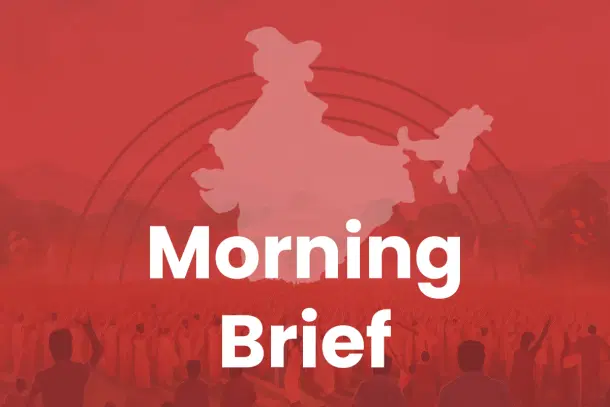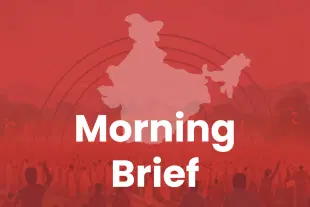News Brief
Morning Brief: PM Modi Condemns Attack On Devotees At Hindu Sabha Temple In Canada; EC Orders Immediate Transfer Of Maharashtra DGP Ahead Of Assembly Polls; And More
Swarajya Staff
Nov 05, 2024, 08:55 AM | Updated 08:55 AM IST
Save & read from anywhere!
Bookmark stories for easy access on any device or the Swarajya app.


Dear reader, make sense of the day’s news with Swarajya's roundup of what’s making headlines this morning.
PM Modi Condemns Attack On Devotees At Hindu Sabha Temple In Canada As Tensions Rise
Hours after an attack by a Khalistani mob on a Hindu Sabha temple in Brampton, where Indian diplomats were visiting ahead of Diwali celebrations, Prime Minister Narendra Modi strongly condemned the violence.
Taking to social media platform X, in his first comment since the latest round of tensions between New Delhi and Ottawa began, Modi said: “I strongly condemn the deliberate attack on a Hindu temple in Canada."
Modi also referred to the “appalling cowardly attempts” to intimidate Indian diplomats in Canada and said: “Such acts of violence will never weaken India’s resolve.”
His comments came just hours after the Ministry of External Affairs expressed its “deep concern” about the safety and security of Indian nationals in Canada, especially in the wake of anti-India protests and violence around the temple premises.
Opposition Lawmakers On Warpath Over Waqf Bill
Opposition MPs in the parliamentary committee reviewing the Waqf (Amendment) Bill are planning to meet Lok Sabha Speaker Om Birla on Tuesday (November 5, 2024) to voice their concerns about the alleged unilateral actions of the committee chairperson, Jagdambika Pal.
The opposition members have expressed dissatisfaction over what they describe as attempts to "bulldoze" proceedings, with insufficient time to adequately prepare for the sessions.
In a letter circulated among opposition lawmakers on Monday, they claimed they had been "stonewalled" during the committee's deliberations.
Prominent opposition leaders, including DMK’s A Raja, Congress’s Mohammad Jawed and Imran Masood, AIMIM’s Asaduddin Owaisi, AAP’s Sanjay Singh, and TMC’s Kalyan Banerjee, are among those who signed the joint letter addressed to Speaker Birla.
The opposition lawmakers have specifically criticized Jagdambika Pal, a senior BJP MP, for making decisions regarding the committee’s schedule and witness invitations without proper consultation, including setting consecutive meeting dates and unilaterally choosing witnesses.
From The States
Apex Court To Consider ‘Perpetual Ban’ On Firecrackers In The National Capital
The Supreme Court on Monday (November 4, 2024) asked the Delhi government to take a call on imposing a permanent prohibition on firecrackers in the national capital, noting that pollution levels reached an “all-time high” during Diwali.
“The Government of Delhi may take a call on the perpetual ban on the use of firecrackers in Delhi,” the apex court recorded in its order.
A Bench led by Justice A.S. Oka and including Justice Augustine George Masih indicated that once the Delhi government's response is received, it would consider extending the firecracker ban beyond the Deepavali period to include other events and festive occasions, such as weddings and elections, where the use of firecrackers is common.
The court referred to submissions by amicus curiae Aparajitha Singh, who cited a report from the Centre for Science and Environment (CSE). The report highlighted a significant rise in pollution levels in Delhi during Diwali, compounded by an increase in farm fires in the surrounding areas.
EC Transfers Maharashtra DGP Rashmi Shukla Ahead Of Assembly Polls
The Election Commission (EC) on Monday (November 4, 2024) transferred Maharashtra’s Director General of Police (DGP), Rashmi Shukla, just two weeks before the state’s Assembly elections.
Shukla, a 1988-batch Indian Police Service (IPS) officer, had come under scrutiny after a formal complaint was filed by Maharashtra Congress chief Nana Patole, accusing her of political bias in favor of the BJP. Patole had called for her transfer to ensure free and fair elections.
In response, the EC directed that the seniormost officer take over as the state DGP. As a result, 1989-batch IPS officer Vivek Phansalkar, the current Mumbai Police Commissioner, will temporarily assume the role of Maharashtra’s DGP.
The EC has also instructed the state government to submit a panel of three eligible officers by Tuesday, from which a new permanent DGP will be appointed. Among those suggested for the position are Sanjay Kumar Verma, Retesh Kumaarr, and Sanjeev Singhal. The EC will now choose the new DGP from these names.
However, questions remain about the nature of Shukla’s transfer. It is unclear whether her removal is a temporary measure just for the election period or a permanent reassignment.
From The Economy
22 Sub-Committees To Review IT ACT
The Department of Revenue has established 22 specialized sub-committees to review the various provisions of the Income Tax Act, 1961.
Revenue Secretary Sanjay Malhotra conveyed this during a meeting chaired by Finance Minister Nirmala Sitharaman on Monday, aimed at taking stock of the Budget announcement regarding the comprehensive review of the Act.
These committees have actively engaged in numerous meetings, both in person and via video conference, with domain experts to collaboratively explore and recommend improvements to the Act.
During the meeting, the Revenue Secretary also shared that over 6,500 valuable suggestions had been received through an online portal launched on October 6, 2024. The response underscores significant public engagement and interest in simplifying and refining the provisions of the Income Tax Act, with a view to making the tax system more efficient and user-friendly.
India To Revamp Power Demand Forecasting
India is revamping its approach to forecasting electricity demand to better align generation capacity with actual needs, while ensuring grid stability amid the growing integration of clean energy sources.
The Central Electricity Authority (CEA), the government body responsible for energy planning, is working closely with weather agencies to improve environmental data access and plans to introduce more frequent demand forecasts to account for unexpected fluctuations, according to Ghanshyam Prasad, chairperson of the CEA.
In an interview with Bloomberg in New Delhi, Prasad explained that previously, detailed demand assessments were conducted every five years. However, this will now shift to a biennial review, with the goal of making it an annual exercise in the near future.
The changing patterns of power consumption, the increased reliance on intermittent renewable energy sources such as solar and wind, and the growing frequency of extreme weather events have all made accurate demand forecasting more challenging. As a result, these systemic reforms are necessary to ensure that supply matches demand more precisely, helping to keep costs in check for utilities and avoid potential blackouts.





